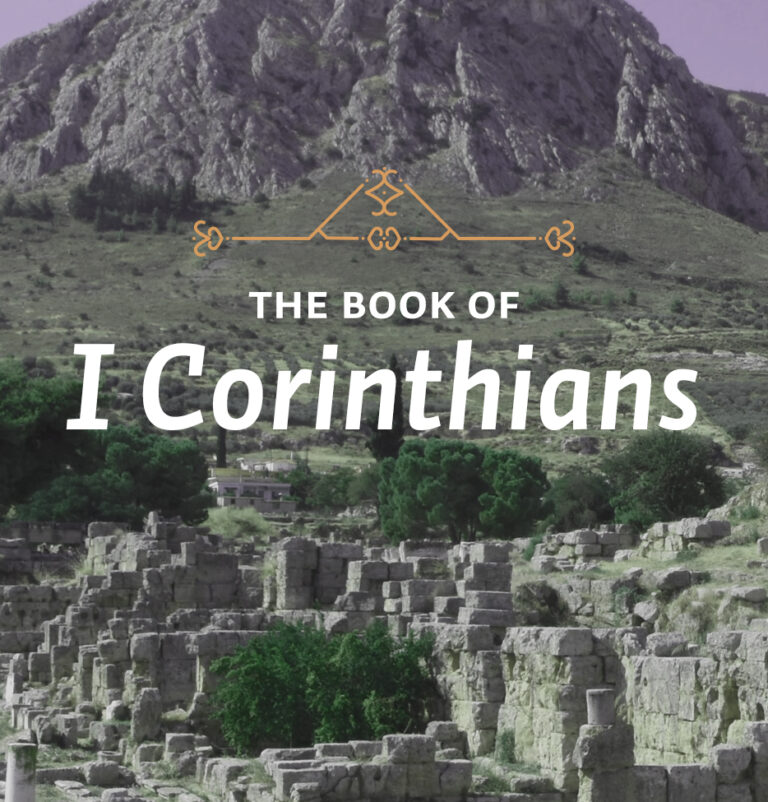


Yesterday we saw that the Corinthian church seemed to be thriving – at least in worldly terms. But we find, given his tone, that Paul is being sarcastic. He is saying, “You already have what you want. You have become rich. You have become kings and you have done it all without us. Good for you! I wish that you really had become kings so that we might become kings with you.”

A Disciple After God’s Own HeartJohn 21:1-19Theme: Yes, Lord!In this week’s lessons, Dr. Philip Ryken teaches us about restoration and obedience.
Lesson

A Disciple After God’s Own HeartJohn 21:1-19Theme: Yes, Lord!In this week’s lessons, Dr. Philip Ryken teaches us about restoration and obedience.
Lesson

A Disciple After God’s Own HeartJohn 21:1-19Theme: Yes, Lord!In this week’s lessons, Dr. Philip Ryken teaches us about restoration and obedience.
Lesson

A Disciple After God’s Own HeartJohn 21:1-19Theme: Yes, Lord!In this week’s lessons, Dr. Philip Ryken teaches us about restoration and obedience.
Lesson

A Disciple After God’s Own HeartJohn 21:1-19Theme: Yes, Lord!In this week’s lessons, Dr. Philip Ryken teaches us about restoration and obedience.
Lesson

The Path of DiscipleshipMatthew 9:9-13; Mark 1:16-20; John 21:17-22Theme: Following Christ.This week’s lessons teach us the cost of being a true disciple of Jesus Christ.
Lesson

The Path of DiscipleshipMatthew 9:9-13; Mark 1:16-20; John 21:17-22Theme: Following Christ.This week’s lessons teach us the cost of being a true disciple of Jesus Christ.
Lesson

The Path of DiscipleshipMatthew 9:9-13; Mark 1:16-20; John 21:17-22Theme: Following Christ.This week’s lessons teach us the cost of being a true disciple of Jesus Christ.
Lesson

The Path of DiscipleshipMatthew 9:9-13; Mark 1:16-20; John 21:17-22Theme: Following Christ.This week’s lessons teach us the cost of being a true disciple of Jesus Christ.
Lesson

The Path of DiscipleshipMatthew 9:9-13; Mark 1:16-20; John 21:17-22Theme: Following Christ.This week’s lessons teach us the cost of being a true disciple of Jesus Christ.
Lesson

Theme: How to Be Truly Happy
From this week’s lessons, we see that genuine happiness is found, not where the world assumes it to be, but in imitating the Lord Jesus Christ.
Scripture: Matthew 5:1-12
If a producer of a popular movie, a director of one of today’s successful television shows, or the editor of a widely circulating news or fashion magazine were to rewrite the Beatitudes from a contemporary point of view, I suppose they would go like this: Blessed are t

Theme: Pursuit of Happiness
From this week’s lessons, we see that genuine happiness is found, not where the world assumes it to be, but in imitating the Lord Jesus Christ.
Scripture: Matthew 5:1-12
There are a number of ways by which people try to obtain happiness. One man thinks that the way to happiness is through wealth. So he sets his financial goals on a hundred thousand dollars. He gets his hundred thousand, but he is not happy. He sets his goals higher.

Theme: The Way to Happiness
From this week’s lessons, we see that genuine happiness is found, not where the world assumes it to be, but in imitating the Lord Jesus Christ.
Scripture: Matthew 5:1-12
1. “Blessed are the poor in spirit.” In Luke’s version of the Beatitudes the words “in spirit” do not occur (Luke 6:20).

Theme: The Way to Happiness, Continued
From this week’s lessons, we see that genuine happiness is found, not where the world assumes it to be, but in imitating the Lord Jesus Christ.
Scripture: Matthew 5:1-12
4. “Blessed are those who hunger and thirst for righteousness.” In my study I have a book by Walter Trobisch, a German missionary to West Africa, entitled, Living with Unfulfilled Desires.

Theme: Imitation of Christ
From this week’s lessons, we see that genuine happiness is found, not where the world assumes it to be, but in imitating the Lord Jesus Christ.
Scripture: Matthew 5:1-12
8. “Blessed are those who are persecuted because of righteousness.” The last of the Beatitudes speaks of happiness in persecution.

Theme: Four Great Universals
In this week’s lessons on the Great Commission, we are promised that Jesus is with us to the very end as we obey his command to go into all the world to make other disciples.
Scripture: Matthew 28:18-20
In that great challenge to evangelism just before His ascension, known as the Great Commission, Jesus commanded that His disciples disciple others.

Theme: All Authority
In this week’s lessons on the Great Commission, we are promised that Jesus is with us to the very end as we obey his command to go into all the world to make other disciples.
Scripture: Matthew 28:18-20
Yesterday we ended by mentioning the first part of Christ’s authority, which is his authority in heaven. Today we look at the other three.
2. Authority over spiritual forces.

Theme: All Nations
In this week’s lessons on the Great Commission, we are promised that Jesus is with us to the very end as we obey his command to go into all the world to make other disciples.
Scripture: Matthew 28:18-20
The second of these is “all nations.” It refers, as I indicated in the last section, to the universal authority of Jesus and the worldwide character of Christianity.

Theme: Teaching Everything
In this week’s lessons on the Great Commission, we are promised that Jesus is with us to the very end as we obey his command to go into all the world to make other disciples.
Scripture: Matthew 28:18-20
Yesterday’s devotional concluded by looking at the first two elements of faithful Christian teaching. Today we will consider four others.
3. The depravity of man.

Theme: All the Days
In this week’s lessons on the Great Commission, we are promised that Jesus is with us to the very end as we obey his command to go into all the world to make other disciples.
Scripture: Matthew 28:18-20
Over the past two days we listed six subjects that faithful teaching needs to include: a high view of Scripture, the sovereignty of God, the depravity of man, grace, work to do, and the security of the believer in Christ.

Theme: Costly Grace
This week’s lessons impress upon us the importance that one cannot be a true Christian without being a genuine disciple of the Lord Jesus Christ.
Scripture: Luke 5:31, 32
There is a defect, even a fatal defect, in the life of the church of Christ in the present day: a lack of true discipleship. For the genuine Christian, discipleship means forsaking everything to follow Christ.

Theme: “Follow Me”
This week’s lessons impress upon us the importance that one cannot be a true Christian without being a genuine disciple of the Lord Jesus Christ.
Scripture: Luke 5:31, 32
But it is not only a false theology that has encouraged this fatal lack of discipleship. To limit it thus is to blame theologians, and God does not allow us to blame others for our own failures.

Theme: Elements of Discipleship: Obedience and Repentance
This week’s lessons impress upon us the importance that one cannot be a true Christian without being a genuine disciple of the Lord Jesus Christ.
Scripture: Luke 5:31, 32
In the course of this devotional series, each of the following elements will be considered in much greater detail.

Theme: Elements of Discipleship: Submission and Commitment
This week’s lessons impress upon us the importance that one cannot be a true Christian without being a genuine disciple of the Lord Jesus Christ.
Scripture: Luke 5:31, 32
3. Submission. In one of Jesus’s most important sayings about discipleship—which we will study more carefully next week—the Lord pictures discipleship as putting on a yoke.

Theme: Whoever Will May Come
This week’s lessons impress upon us the importance that one cannot be a true Christian without being a genuine disciple of the Lord Jesus Christ.
Scripture: Luke 5:31, 32
Yesterday we looked at submission and commitment as elements of discipleship. We now come to the final element.
5.

Theme: The Universal Call to Discipleship
From this week’s lessons we see that Christ’s call to discipleship is described as a yoke that is both easy and light because Jesus is a kind and gentle Master.
Scripture: Matthew 11:28-30
In one form or another the knowledge of the human race has been passed through the centuries.

Theme: Learning Jesus Christ
From this week’s lessons we see that Christ’s call to discipleship is described as a yoke that is both easy and light because Jesus is a kind and gentle Master.
Scripture: Matthew 11:28-30
But notice: it is for those who know themselves to be burdened. This does not refer to mere physical weakness or to what we would call the burdens of a hard life, though it may include them.

Theme: Under the Yoke: Submission
From this week’s lessons we see that Christ’s call to discipleship is described as a yoke that is both easy and light because Jesus is a kind and gentle Master.
Scripture: Matthew 11:28-30
We must be careful to explain what we mean when we speak of knowing God in a saving way, however. For this is no mere intellectual knowledge of God, any more than saving faith is mere intellectual assent to certain truths.

Theme: Under the Yoke: Work and Companionship
From this week’s lessons we see that Christ’s call to discipleship is described as a yoke that is both easy and light because Jesus is a kind and gentle Master.
Scripture: Matthew 11:28-30
Yesterday we looked at the first important element of a yoke. Today we study the other two.
2. Work. The yoke placed upon the shoulders of a farm animal enables it to work.

Theme: An Easy Burden
From this week’s lessons we see that Christ’s call to discipleship is described as a yoke that is both easy and light because Jesus is a kind and gentle Master.
Scripture: Matthew 11:28-30
When we think of being harnessed together with others in Christ’s school it is possible to be discouraged, especially if we reflect that the work is hard and the course of instruction is unending.

Theme: Self-Esteem or Self-Denial?
This week’s lessons teach us that Jesus’ command for Christians to take up their cross is not something that happens later in the Christian life, but at the very beginning. Indeed it is a critical idea of discipleship itself.
Scripture: Luke 9:23-26
At the beginning of these studies I wrote that there is a fatal flaw in the professing church today, a lack of true discipleship. Discipleship is talked about, of course.

Theme: Saying “No” to Self
This week’s lessons teach us that Jesus’ command for Christians to take up their cross is not something that happens later in the Christian life, but at the very beginning.

Theme: Saying “Yes” to God
This week’s lessons teach us that Jesus’ command for Christians to take up their cross is not something that happens later in the Christian life, but at the very beginning. Indeed it is a critical idea of discipleship itself.
Scripture: Luke 9:23-26
But it is not only that we are to say “No” to self, which is what denying self is all about.

Theme: The Demands of Cross-Bearing
This week’s lessons teach us that Jesus’ command for Christians to take up their cross is not something that happens later in the Christian life, but at the very beginning. Indeed it is a critical idea of discipleship itself.
Scripture: Luke 9:23-26
Yesterday we looked at the first demand of taking up our cross. Today we want to look at four more.
2.

Theme: Our Eyes on Jesus
This week’s lessons teach us that Jesus’ command for Christians to take up their cross is not something that happens later in the Christian life, but at the very beginning.

Theme: Profession without Practice
This week’s lessons stress the necessity of obedience if one is truly a disciple of the Lord Jesus Christ.
Scripture: Luke 6:46-49
Jesus spoke about obedience toward the end of Luke’s version of the Sermon on the Mount. He had been followed by people who made verbal profession of discipleship.

Theme: How Does Jesus Speak?
This week’s lessons stress the necessity of obedience if one is truly a disciple of the Lord Jesus Christ.
Scripture: Luke 6:46-49
Several years ago, when I was in northern California, I turned on the radio and heard part of an unusual religious program. It was called “Have You Had a Spiritual Experience?” and was conducted like a call-in talk show.

Theme: Living in the Book: Daily and Systematic Bible Study
This week’s lessons stress the necessity of obedience if one is truly a disciple of the Lord Jesus Christ.
Scripture: Luke 6:46-49
Everything I have been saying so far leads to a practical conclusion, and it is this.

Theme: Living in the Book: Comprehensive and Devotional Bible Study
This week’s lessons stress the necessity of obedience if one is truly a disciple of the Lord Jesus Christ.
Scripture: Luke 6:46-49
Yesterday we mentioned what systematic Bible study is. We now need to see how one does it. Certain procedures should be followed during study. First, the book itself should be read through carefully as many as four or five times, perhaps one of these times aloud.

Theme: The Liberty of Obedience
This week’s lessons stress the necessity of obedience if one is truly a disciple of the Lord Jesus Christ.
Scripture: Luke 6:46-49
Over the last two days we looked at four Bible study methods. Today we begin by mentioning one more.
5. Study the Bible prayerfully (Dan. 9:1-3).

Theme: Love on Its Knees
This week’s lessons remind us that true discipleship is marked by selfless service to others, because that is how Christ treated us.
Scripture: John 13:1-17
Following the Lord Jesus Christ is an individual matter, but it is not individualistic. Let me explain.
When we say that discipleship is an individual matter we are saying that it is something the individual himself must do. No one can follow Jesus for you.

Theme: How to Serve Others: Listening
This week’s lessons remind us that true discipleship is marked by selfless service to others, because that is how Christ treated us.
Scripture: John 13:1-17
We must be practical at this point. Jesus served us by leaving heaven, taking on a true human nature, teaching, and then dying on the cross for our sin. We cannot do that. So we must ask, “How can we serve others?

Theme: How to Serve Others: Helping and Giving
This week’s lessons remind us that true discipleship is marked by selfless service to others, because that is how Christ treated us.
Scripture: John 13:1-17
Yesterday we looked at the first way to serve others. Today we look at the next two.
2.

Theme: How to Serve Others: Bearing Burdens and Speaking God’s Truth
This week’s lessons remind us that true discipleship is marked by selfless service to others, because that is how Christ treated us.
Scripture: John 13:1-17
Yesterday we looked at the need to help one another and to give to others in need.

Theme: How to Serve Others: Restoring
This week’s lessons remind us that true discipleship is marked by selfless service to others, because that is how Christ treated us.
Scripture: John 13:1-17
We now come to the last way we are to serve other people as Jesus did.
6.

Theme: Burdens Rolled Away: Pride
This week’s lessons talk about the need for every Christian to be marked by humility, and that the sins that fight against this humility can only be taken away by the Lord Jesus Christ, whose own humility took him to the cross for us.
Scripture: Matthew 20:20-28
A third incident came before the triumphal entry.

Theme: Burdens Rolled Away: Pretense and Artificiality
This week’s lessons talk about the need for every Christian to be marked by humility, and that the sins that fight against this humility can only be taken away by the Lord Jesus Christ, whose own humility took him to the cross for us.
Scripture: Matthew 20:20-28
2. The burden of pretense.

Theme: Burdens Rolled Away: Self-Struggle
This week’s lessons talk about the need for every Christian to be marked by humility, and that the sins that fight against this humility can only be taken away by the Lord Jesus Christ, whose own humility took him to the cross for us.
Scripture: Matthew 20:20-28
4. The burden of self-struggle.

Theme: Begin with God
This week’s lessons talk about the need for every Christian to be marked by humility, and that the sins that fight against this humility can only be taken away by the Lord Jesus Christ, whose own humility took him to the cross for us.

Theme: Wealth and Poverty
This week’s lessons remind us what the Christian’s attitude and response toward possessions need to be, as disciples of the Lord Jesus Christ.
Scripture: Mark 6:7-11
I received a letter from a couple who were going to the mission field for the first time.

Theme: All Good Gifts from God
This week’s lessons remind us what the Christian’s attitude and response toward possessions need to be, as disciples of the Lord Jesus Christ.
Scripture: Mark 6:7-11
Where should we go to get a proper perspective on riches? Negatively there is much to be said about them, but the place to begin is not with a negative but with a positive: All things come from God. God is the Creator.

Theme: A Christian Perspective
This week’s lessons remind us what the Christian’s attitude and response toward possessions need to be, as disciples of the Lord Jesus Christ.
Scripture: Mark 6:7-11
So I come back to my original question and ask again: What should a disciple’s attitude toward his possessions be? I suggest the following principles:
1. Thanksgiving.

Theme: A Christian Perspective, Continued
This week’s lessons remind us what the Christian’s attitude and response toward possessions need to be, as disciples of the Lord Jesus Christ.
Scripture: Mark 6:7-11
3. Stewardship.

Theme: A Heart Set Free
This week’s lessons remind us what the Christian’s attitude and response toward possessions need to be, as disciples of the Lord Jesus Christ.
Scripture: Mark 6:7-11
I close with an important thought. Wealth is a blessing when properly received and used, but there is something more important than wealth or even the proper use of it. It is being free, as God intends us to be free. Possessions tie us down.

Theme: How We View Other Disciples
This week’s lessons remind us of the need to show unity in the gospel with other believers, including those who are different from us.
Scripture: Mark 9:33-40
Discipleship is personal, but it is not personalistic. It always involves our relationships to others who also profess to be disciples. But are they disciples?

Theme: The Problem Explored
This week’s lessons remind us of the need to show unity in the gospel with other believers, including those who are different from us.
Scripture: Mark 9:33-40
In the incident we are studying, the exorcist not only did what he did in Christ’s name and therefore in open allegiance to Christ. He was also effective in what he did, for he was actually casting out demons.

Theme: Cause of Dissension
This week’s lessons remind us of the need to show unity in the gospel with other believers, including those who are different from us.
Scripture: Mark 9:33-40
I suppose that in the entire history of the church there has never been a division, however unnecessary or sordid, that has not been justified by some persons on spiritual grounds.

Theme: One Body, Many Gifts
This week’s lessons remind us of the need to show unity in the gospel with other believers, including those who are different from us.
Scripture: Mark 9:33-40
There is only one way we will ever defeat this tendency to an improper narrowness in our view of Christian work, and that is to recover a vision of the greatness of the church as Christ’s body.

Theme: Are They with Us?
This week’s lessons remind us of the need to show unity in the gospel with other believers, including those who are different from us.
Scripture: Mark 9:33-40
Yesterday we looked at the first three varieties within the church. Today we look at the last two.
4. There is a variety of methods. When I wrote of “styles” a moment ago I was approaching this area.

Theme: What Is the Cost?
This week’s lessons show the price that must be paid to follow Christ, as well as the blessings that come when we do.
Scripture: Luke 14:25-35
I was talking with a distinguished doctor who was commenting on missionary practices in his area of the world. According to him, there is much valuable work being done, and the people doing it are certainly earnest and dedicated believers. But there is one thing lacking.

Theme: Implications for Sola Scriptura
This week’s lessons show the price that must be paid to follow Christ, as well as the blessings that come when we do.
Scripture: Luke 14:25-35
Jesus also said many specific things about the cost of salvation. “Suppose one of you wants to build a tower. Will he not first sit down and estimate the cost to see if he has enough money to complete it?

Theme: Implications for Sola Fide and Sola Gratia
This week’s lessons show the price that must be paid to follow Christ, as well as the blessings that come when we do.
Scripture: Luke 14:25-35
Yesterday we looked at sola Scriptura. Today we look at sola fide and sola gratia.
2. Sola fide. The second great distinctive is sola fide.

Theme: Considering the Cost
This week’s lessons show the price that must be paid to follow Christ, as well as the blessings that come when we do.
Scripture: Luke 14:25-35
It is not hard to be an outward Christian. A person can go to church once or twice on Sunday and pretend to be tolerably upright during the week. There is no self-denial, no sacrifice here.

Theme: Paying the Cost
This week’s lessons show the price that must be paid to follow Christ, as well as the blessings that come when we do.
Scripture: Luke 14:25-35
What must I pay to be a Christian? I must pay the price of my own self-righteousness, no longer counting myself a good person but rather as one who has transgressed God’s righteous law and is therefore under the sentence of His wrath and condemnation.

Theme: A Hard Saying of Jesus
This week’s lessons focus on the high price of new relationships that must be paid to follow Christ.
Scripture: Luke 14:26
Quite frequently, when I am conducting weddings, I point out that the family is the most basic of all human institutions.

Theme: Beyond Accounting
This week’s lessons focus on the high price of new relationships that must be paid to follow Christ.
Scripture: Luke 14:26
Yesterday we concluded by offering another way to understand our passage, which was that Jesus was speaking in hyperbole; that is, he was intentionally exaggerating in order to make a point.
But there are a number of reasons for thinking that this may be too facile a handling.

Theme: Two Shocking Truths
This week’s lessons focus on the high price of new relationships that must be paid to follow Christ.
Scripture: Luke 14:26
1. The radical demands of Christ’s kingdom. Over the years that I have been in Christian work I have been asked to serve on a number of boards of Christian organizations, and to the extent that I have had time I have been glad to do so. I have done everything I am able to do for these organizations.

Theme: Two More Shocking Truths
This week’s lessons focus on the high price of new relationships that must be paid to follow Christ.
Scripture: Luke 14:26
3.

Theme: A Difficult School
This week’s lessons talk about the need for every Christian to be marked by humility, and that the sins that fight against this humility can only be taken away by the Lord Jesus Christ, whose own humility took him to the cross for us.
Scripture: Matthew 20:20-28
Brother Lawrence, whose collected conversations and letters are entitled The Practice of the Presence of God, lived in the seventeenth century.

Theme: Old Family, New Family
This week’s lessons focus on the high price of new relationships that must be paid to follow Christ.
Scripture: Luke 14:26
But I think I hear you thinking. “That is all well and good, to be talking about breaking with old social acquaintances or other distant friends. But that is quite a different thing from breaking with one’s parents or, worse yet, one’s husband or wife.

Theme: Three Who Faltered
This week’s lessons press the importance that it is not enough to merely show an initial interest in following Christ; one must persevere in obedience to the very end.
Scripture: Luke 9:57-62
Eight hundred years before Christ’s day the prophet Elijah was led to enlist Elisha as his fellow worker and successor. He found Elisha plowing, went to him, and threw his mantle over him.

Theme: The First Two Difficulties
This week’s lessons press the importance that it is not enough to merely show an initial interest in following Christ; one must persevere in obedience to the very end.
Scripture: Luke 9:57-62
1. Physical hardships and deprivation. The first of these three individuals (like the third) volunteered to follow Christ. He said, “I will follow you wherever you go” (Luke 9:57).

Theme: The Third Difficulty
This week’s lessons press the importance that it is not enough to merely show an initial interest in following Christ; one must persevere in obedience to the very end.
Scripture: Luke 9:57-62
3. Determination to set one’s own terms. The third of these three individuals (like the first) also volunteered to follow Jesus. But he wanted to do so on his terms rather than on Jesus’ terms.

Theme: Remember Lot’s Wife
This week’s lessons press the importance that it is not enough to merely show an initial interest in following Christ; one must persevere in obedience to the very end.
Scripture: Luke 9:57-62
When Jesus said of these individuals, “No one who puts his hand to the plow and looks back is fit for service in the kingdom of God,” He was not just making a statement, of course. He was giving a warning.

Theme: Onward! Onward!
This week’s lessons press the importance that it is not enough merely to show an initial interest in following Christ; one must persevere in obedience to the very end.
Scripture: Luke 9:57-62
The greater part of this chapter has been negative, warning those who are contemplating Christ’s service that the mere setting out is not sufficient. There must be perseverance. It is he who “stands firm to the end” who is saved (Matt.

Theme: An Astonishing Statement
This week’s lessons remind us that no matter how great the persecutions we may be called to endure as Christians, we are promised blessings, both in this age and also in the age to come.
Scripture: Mark 10:29, 30
In the great collection of unexpected and challenging teachings about discipleship by Jesus there is perhaps nothing so utterly unexpected (particularly after our study of the earlier sayings) as Jesus’ words in Mark 10:29,

Theme: Encouragement to Serve
This week’s lessons remind us that no matter how great the persecutions we may be called to endure as Christians, we are promised blessings, both in this age and also in the age to come.
Scripture: Mark 10:29, 30
Although this text should not be misused to teach that every Christian is going to be well-off, nevertheless, the text is a great promise, and it does have to do with earthly relationships and material possessions.

Theme: Full Payment and More
This week’s lessons remind us that no matter how great the persecutions we may be called to endure as Christians, we are promised blessings, both in this age and also in the age to come.
Scripture: Mark 10:29, 30
Yesterday we looked at how Abraham would have answered if we were to ask him whether he felt cheated after he left everything to follow God’s call.

Theme: Certain Blessings from God
This week’s lessons remind us that no matter how great the persecutions we may be called to endure as Christians, we are promised blessings, both in this age and also in the age to come.
Scripture: Mark 10:29, 30
2. Certain blessings. It is not only the greatness of the blessings promised by Jesus that encourage us in His service. Their security encourages us too.

Theme: Encouragement to Trust
This week’s lessons remind us that no matter how great the persecutions we may be called to endure as Christians, we are promised blessings, both in this age and also in the age to come.
Scripture: Mark 10:29, 30
Christ’s words to the disciples in Mark 10:29, 30 are not just an encouragement to serve Christ, important as that is. They are also an encouragement to trust Him through difficult times.

I do not like the phrase “cheap grace,” which Dietrich Bonhoeffer has made popular and which he deplores. For grace in a very real sense is cheap, or, what is even better to say, is without cost entirely. It is true that grace cost God the Father the death of the Son. But for us grace is bestowed totally without payment, and it is abounding even though we fall back into sin or abuse it. I believe that without an explanation the term “cheap grace” obscures this. Nevertheless, the phrase has some value. We can refer to it profitably now at this point in our studies on the final verses of the Sermon on the Mount.

In the light of these truths it is evident that Christ’s words are a particularly pertinent warning to those who blithely believe a few doctrines or who perform a smattering of so-called good works, and yet have never entered into that kind of true commitment to Christ which results in increasingly costly obedience and in true discipleship.

Because a man can believe certain Christian doctrines with his head and yet still not be converted, there will always be counterfeit or nominal Christians in Church circles. Some of them will be dangerous, for they will be planted there by the devil to deceive the unwary, like tares in fields of wheat. Others will only be self-deluded. Whatever the case, however, the world will be able to point to them and say, “Ah look at those hypocrites; that’s why I’m not a Christian.” Don’t be discouraged by that. Just be sure that you are not one of them. If you are not to be, you must ask the Lord to reveal the state of your own heart before Him and lead you to the fullness of belief in Christ and commitment to Him.

Doctrine is only the first area in which many persons find a false spiritual confidence. A second area is works (v. 22). For there will always be somebody to say, “It’s not just that I believe these things and hear sermons about them. I really serve Christ. I prophesy in His name (it is preaching today). I cast out demons (it is revolution today). I have done many wonderful works (these are the good deeds of Christianity).” Jesus says that it is quite possible for a person to be baptized in the Christian Church, to be confirmed, to take communion, to serve on the church’s boards, even to be a missionary, and still never have come to the place where he is born again.

What matters is the reality of your own personal commitment to Jesus. Are you a Christian? Is it real? The answer to that question does not depend upon your intellectual beliefs (“Lord, Lord”) or upon your good works (“Have we not prophesied in thy name?”), but upon your relationship to the Lord Jesus. Have you ever asked Him to be your Savior? Have you ever said, “Lord Jesus Christ, I want you to enter my heart?” If you have never done that, then you must know that this is the gate to salvation. If you have, then you can be assured that He has entered your life. For He has said, “Blessed are they who do hunger and thirst after righteousness; for they shall be filled” (Matt. 5:6). He says, “Him that cometh to me I will in no wise cast out” (John 6:37).

We come to the very last words of the Sermon on the Mount, the section in which Jesus Christ pictures the difference between those who hear His teachings and do them and those who hear His teachings and do not do them as the difference between a wise man who builds his house upon a rock, and a foolish man who builds his house upon sand. It is a picture that all people know. And it is one that most of us have sung about, in one hymn or another, since the time we were children.

In these closing words of His sermon Jesus was stressing the importance of an adequate foundation, and He is asking the question, “What is your foundation? On what do you build?”

The second important point to be seen in these verses is this: A life built upon Jesus Christ will stand. That is a simple point, of course, but we need to have it clear in our thinking and to get it planted deeply in our minds. A life built upon Jesus will stand, even in the midst of the tribulations of this life or the judgments of eternity.

Now there is one last point here, and it is a point for Christians. What are you building? Oh, you are on the foundation all right. Christ is your Savior. But do you know that it may be possible for Him to be your foundation and yet for you to go through life building things that are worthless and that will not remain as fruit for eternity, even though you will be saved personally?

What are you building upon the foundation that is given you by God? Are you living to yourself? It is entirely possible for Christians to do that. Or are you living for Him? Are you using the talents, blessings, opportunities, influence, and wealth that He has given you to build Christian character and bring men to the Lord Jesus Christ as their Savior?

No other books of the New Testament more clearly reflect the current letter writing style of the first century than do 2 and 3 John. There is an opening greeting, in which the author identifies himself and names those to whom he is writing. There is an opening salutation. This is followed by the body of the letter, containing the message. Then there is a closing salutation in which the author expresses his hopes of seeing the one to whom he is writing and sends a final greeting. The letters of 2 and 3 John follow this format. But, like the other New Testament books which also follow it, particularly the Epistles of Paul, these books introduce distinctly Christian ideas by which the conventional forms are both elevated and transformed.

The unique feature of this opening salutation is John’s surprising emphasis upon truth and his linking of the truth he thus emphasizes to love. Indeed, the word “truth” occurs four times in the first three verses and one more time in verse four.

There is much in the life of the local church to give John cause for rejoicing, but this does not mean that there is no more room for growth. These to whom he writes are Christians. Their lives meet the three tests: the moral test (which is righteousness or obedience to God’s commands), the social test (which is love), and the doctrinal test (which is the test of truth or sound doctrine). But this does not mean that their lives are as marked by righteousness as they might be, that they love each other fully, or that they have totally assimilated the whole of Christian doctrine.

There is a true progress in the Christian life, but it is progress based upon a deeper knowledge of the historical, biblical Christ. Progress on any other ground may be called progress, but it is a progress that leaves God behind and is, therefore, not progress at all.

The second part of John’s instructions to the local church reveals how strongly he feels about the danger. For here the Christians are not only warned. They are also instructed to have no part in encouraging either the false teachers or their false doctrines. In fact, says John, do not even greet them, for in so doing you may be sharing in their wicked work.

Canadian Committee of The Bible Study Hour
PO Box 24087, RPO Josephine
North Bay, ON, P1B 0C7